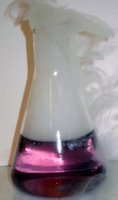 Conboy IM, Conboy MJ, Wagers AJ, Girma ER, Weissman IL, Rando TA. 2005. Rejuvenation of aged progenitor cells by exposure to a young systemic environment. Nature 433: 760-764.
Conboy IM, Conboy MJ, Wagers AJ, Girma ER, Weissman IL, Rando TA. 2005. Rejuvenation of aged progenitor cells by exposure to a young systemic environment. Nature 433: 760-764.These researchers are interested in a particular cell-cell signalling molecule, a transmembrane protein encoded by the gene Notch. This is a popular gene for lots of different types of cytological, genetic and developmental research -a quick search for "Notch" in Web of Science collects 1 259 hits.
The focus of this paper was on cell age and senescence. Their main hypothesis is that old muscle and liver cells, which function at reduced capacity, can be regenerated by exposing them to a "young systemic environment" in the form of blood from a younger individual. This work, of course, wasn't on humans, but mice.
To test their hypothesis, they hooked the circulatory systems of two mice together - one young, one old, then examed cells in the older individual. They found that stem cells in the skeletal muscle and liver of the older mouse, cells responsible for regenerating damaged tissue, had higher expression levels of Notch and other factors, and showed signs of behaving younger than they otherwise would.
My favourite is the last sentence of the abstract:
These results suggest that the age-related decline of progenitor cell activity can be modulated by systemic factors that change with age.
In other words, we think we can make you young again by stealing the blood of a child and pumping it through your veins.
BWA HAHAHAHA! Bring in the next test subject!


No comments:
Post a Comment